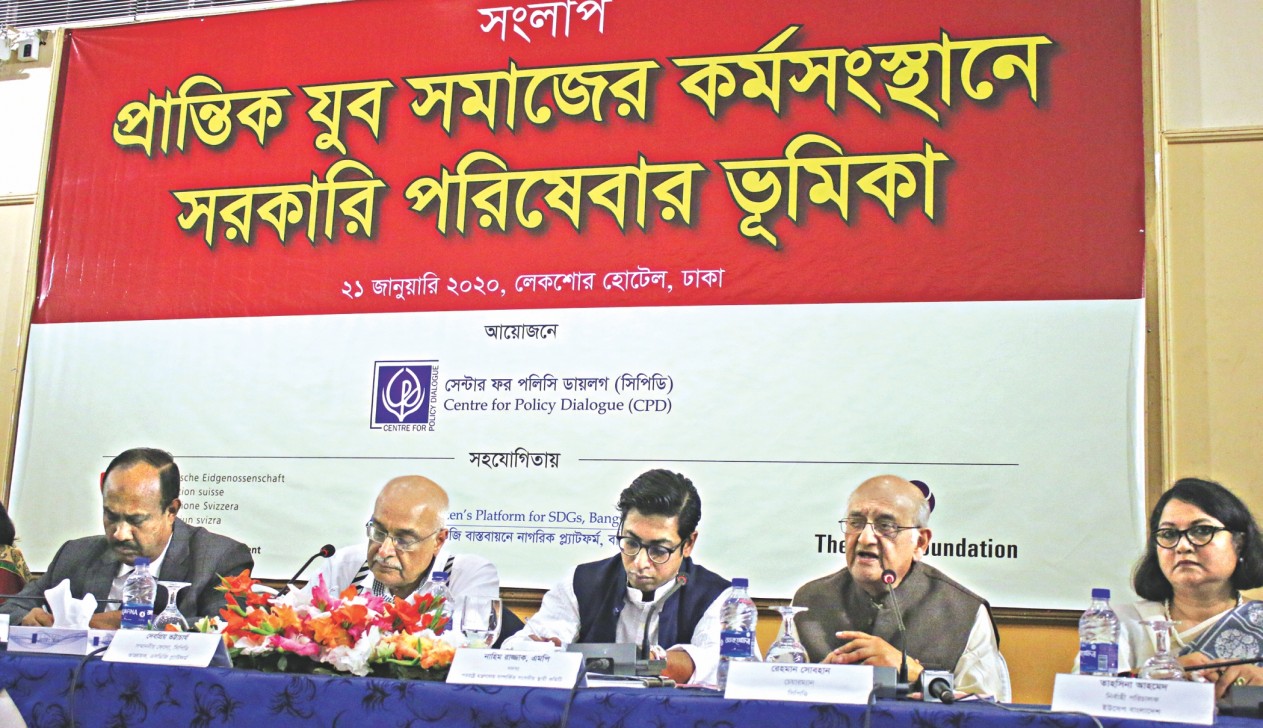Govt failing to create jobs for youths fast enough

The government will be able to create only half of the 3 crore jobs it promised to generate by 2030 at the current pace of employment growth, said a think-tank yesterday, in a disheartening projection for the growing number of youth desperate for work.
In its election manifesto in 2018, the Awami League had pledged to create the jobs by 2030. But according to the projections of the International Labour Organisation (ILO), 1.49 crore jobs would be created at the existing rate of employment growth of 2.4 per cent.
“This means, only half of the job creation targets of the government will be achieved by 2030,” said the Centre for Policy Dialogue (CPD) in a new study.
The study was unveiled at a dialogue on “Role of the Public Service Delivery in Ensuring Employment for the Marginalised Youth Community”, organised by the CPD at the capital’s at the Lakeshore Hotel.
It is not possible to pull off the employment goal, particularly create the expected number of jobs for the youth, through traditional methods, the study report said.
“It is the state’s responsibility to take up programmes for the youth,” said Rehman Sobhan, a noted economist and chairman of the CPD.
He criticised the culture as youth now have to go through political DNA test to avail government jobs.
About 12.2 per cent of the total of 2 crore youth are unemployed in the country. Of them, 74 lakh youth have no scope for education, training or involvement in employment.
A big chunk of them are from marginalised groups with no access to various facilities availed by their peers in urban areas, the report said.
The number of youth rises to a third of the total labour force if they cover those aged between 15 and 29 years.
Poor economic condition as well as backward position in education and training compared to their peers in urban areas push the marginalised groups further in the job market, said Khondaker Golam Moazzem, research director of the CPD, in his presentation.
As a result, the youth, particularly those from plain-land indigenous groups and slum youths, find the level of challenge for accessing jobs high, he said.
Some social safety net programmes of the government are playing a role in improving the livelihood of marginalised communities but it is not sufficient to solve the housing problem they face.
A lack of transparency of state-run service providers is a major concern for slum-dwellers, particularly related to their housing issues, he said.
The youth in the marginalised communities could not receive minimum education. They do not have access to adequate number of skilled teachers and also cannot afford private tuition, the report said.
Third gender youth cannot complete study due to discrimination and humiliation at schools and physically challenged youths are facing constraints in pursuing education, according to Moazzem.
Absence of accountability and transparency mechanism disproportionately affect the marginalised youths, he added.
The youth in the marginalised communities are deprived of minimum educational facilities and hardly meet the cost of education. The government should increase the stipend allocation to help them cover all education-related expenses.
The study found that despite fierce competition in the domestic job market, particularly in the low-skilled jobs and low-earning business activities, the desire to work abroad is rather low among the marginalised youth.
Only a third of the total youth are interested to go abroad for jobs, perhaps due to limited financial capacity to bear migration-related cost.
Besides, students who go to madrasas cannot meet the skill demand of the market because of the traditional educational system.
Md Mujibul Haque, chairman of the parliamentary standing committee on labour and employment ministry, stressed the need for need-based education instead of higher education.
He called for a change to the mind set about madrasa-based education and incorporating modern education to help them compete in the job market.
Nahim Razzaq, a lawmaker, criticised the government’s vocational institutes, saying their quality is poor due to a lack of proper monitoring.
Only 14 per cent students in the country receive vocational education, which is very low compared to developed countries, said Rumeen Farhana, another lawmaker.
She blamed the social mind set as vocational education is not well regarded.
There is a lack of flow of information, coordination and skilled human resources standing in the way of delivering government facilities to the youth of marginalised groups, said Debapriya Bhattacharya, a distinguished fellow of the CPD.
Fahmida Khatun, executive director of the think-tank, suggested other ministries along with the youth and sports ministry should implement programmes for the youth in rural levels for skill development.
She called for increasing budgetary allocation for education and training from existing 2 per cent of gross domestic product.
Tahsinah Ahmed, executive director of the UCEP, and Tanjia Akhter Tania, a dweller in Karail slum, also spoke. Mustafizur Rahman, a distinguished fellow of the CPD, was present.
